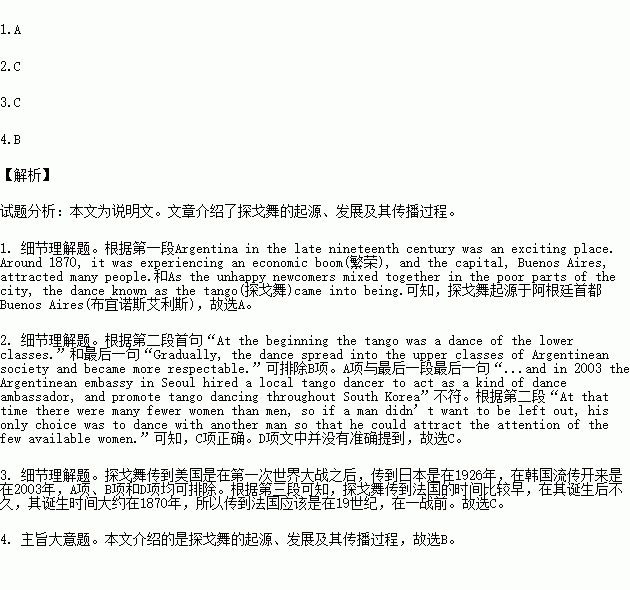题目内容
Argentina in the late nineteenth century was an exciting place. Around 1870, it was experiencing an economic boom(繁荣), and the capital, Buenos Aires, attracted many people. Farmers, as well as a flood of foreigners from Spain and Italy, came to Buenos Aires seeking jobs. These jobs didn’t pay well, and the people felt lonely and disappointed with their new life in the city. As the unhappy newcomers mixed together in the poor parts of the city, the dance known as the tango(探戈舞) came into being.
At the beginning the tango was a dance of the lower classes. It was danced in the bars and streets. At that time there were many fewer women than men, so if a man didn’t want to be left out, his only choice was to dance with another man so that he could attract the attention of the few available women. Gradually, the dance spread into the upper classes of Argentinean society and became more respectable.
In Europe at this time, strong interest in dance from around the world was beginning. This interest in international dance was especially evident in Paris. Every kind of dance from ballet(芭蕾舞) to belly dancing could be found on the stages of the Paris theaters. After tango dancers from Argentina arrived in Europe, they began to draw the interest of the public as they performed their exciting dance in cafes. Though not everyone approved of the new dance, saying it was a little too shocking, the dance did find enough supporters to make it popular.
The popularity of the tango continued to grow in many other parts of the world. Soldiers who returned to the United States from World War I brought the tango to North America. It reached Japan in 1926, and in 2003 the Argentinean embassy(大使馆) in Seoul hired a local tango dancer to act as a kind of dance ambassador, and promote tango dancing throughout South Korea.
1.The origin of the tango is associated with ________.
A. the capital of Argentina
B. a Spanish city
C. American soldiers
D. belly dancers
2.Which of the following is true about the tango?
A. A dancer in Seoul became the Argentinean ambassador.
B. People of the upper classes loved the tango most.
C. It was often danced by two males in the beginning.
D. It was created by foreigners from Spain and Italy.
3.Before World War I, the tango spread to ________.
A. South KoreaB. JapanC. FranceD. America
4.What can be the best title for the text?
A. The Modern Tango BoomB. The History of the Tango
C. How to Promote the TangoD. How to Dance the Tango
 暑假作业海燕出版社系列答案
暑假作业海燕出版社系列答案
